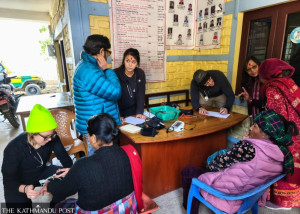Health
World children’s day celebrated through cricket
UNICEF, CAN, and Australian Embassy jointly organise a cricket match to promote children’s rights, gender equality.
Post Report
The United Nations Children’s Fund (UNICEF) in partnership with the Cricket Association of Nepal (CAN) and the Embassy of Australia, organised a special cricket event at the Tribhuvan University International Cricket Ground in Kritipur on Thursday to mark World Children’s Day 2025.
The celebration highlighted the importance of child rights, gender equality and the power of sport to break barriers and inspire social change.
Observed globally every year on November 20, World Children’s Day commemorates the adoption of the Convention on the Rights of the Child. It is UNICEF’s annual day of action for children, by children, calling on governments, communities and families to uphold every child’s right to learn, play, be protected and participate in decisions that affect their lives.
This year, UNICEF-Nepal celebrated the day through the joint initiative “Leveling the Playing Field”—a partnership between UNICEF, CAN and the Embassy of Australia, that uses the reach and influence of cricket to promote equal opportunities for girls and boys across Nepal and ensure that adolescent girls stay in school, access essential services and participate fully in their communities.
The joint event provided a platform to amplify children’s voices and spotlight the challenges many still face — including child marriage, early pregnancy, limited access to education and unequal opportunities for girls, a UNICEF statement said.
“All we ask is a fair chance. Let girls learn, let girls choose and let girls lead. When you invest in us today, we can build a better tomorrow for everyone,” said Manushka Rana Magar, a 13-year-old girl studying in grade 7 at Shree Gamvir Samudra Setu Secondary School.
More than 300 children participated in the event, which included a friendly cricket match where children played alongside Nepal’s national women’s cricket team.
Nepal is home to over three million adolescent girls — future leaders, innovators and change-makers. Yet one in three girls is still married before the age of 18, and more than 15 percent of girls eligible for upper secondary school have dropped out or never enrolled.




 15.12°C Kathmandu
15.12°C Kathmandu













